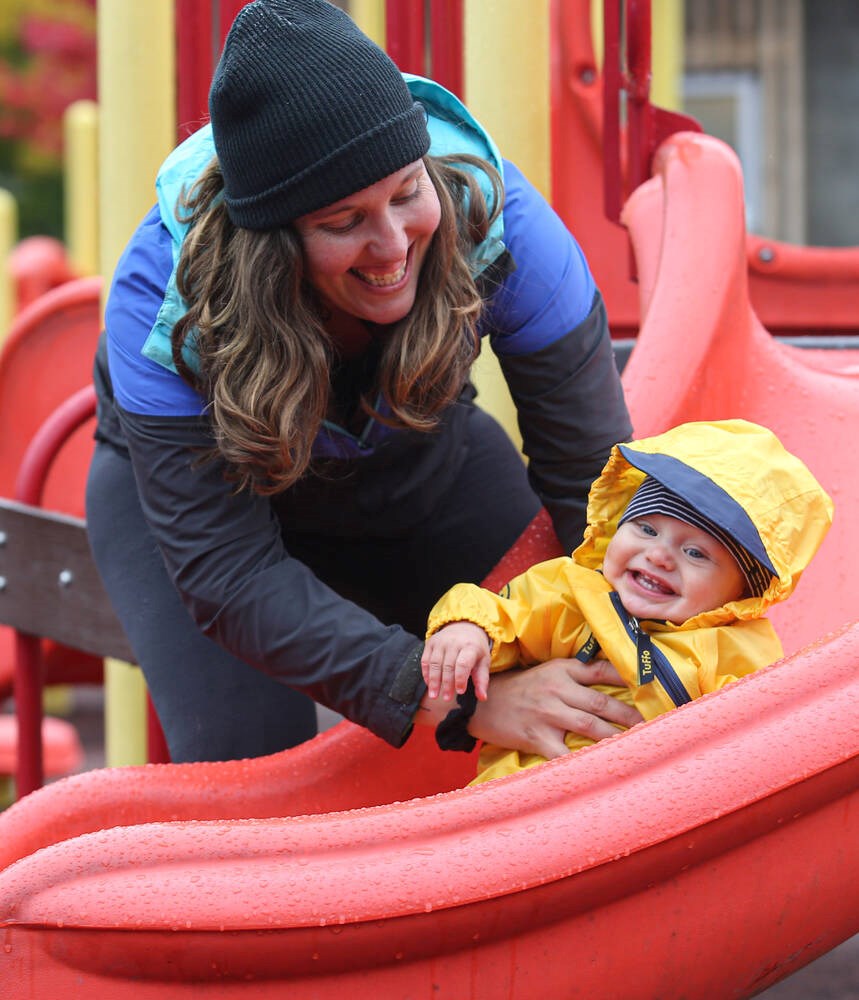Hey, remember August when we were all wetting ourselves (or not) over the lack of rain? Good times, good times.
Victoria dodged a bullet Saturday. Most of Vancouver Island was told to brace for an “atmospheric river” — not just rain, but a power washer capable of scouring away every moment of our sun-soaked summer — but down here in Dysfunction-By-The-Sea, it was mostly glorious.
Me, I spent a warm, dry afternoon watching regatta rowers fight the Gorge rapids. Meanwhile, up-Island they wished they had the rowers’ boats to get out of their driveways. Water pooled on highways. B.C. Hydro warned people in the Comox Valley to stay away from the Puntledge River. The Lower Mainland was under a flood watch.
Victoria’s sunny break was a nice respite. It’s still only October, or maybe Octember, but the damp and chill arrived early this fall, just like your in-laws. And we have another five months of it to go, too. Feels like we’ve been scored on three times in the first minute of the game.
Not everyone shares my glumness. Any time I moan about the gloom and grey, some chipper, beaming, unfortunately healthy zealots will reply with “There is no bad weather, only bad clothing.” Then, after running up and down Mount Finlayson a couple of times, they will wax on about the life-sustaining qualities of rain, and the beauty of mist hanging in the cedars, and the poetry of precipitation on the windowpane, which makes me think that these people do not dig ditches for a living. I also suspect they eat kale on purpose, practise mindfulness and drink tea made from what appears to be compost. I forgive them, because I am big-hearted that way.
Others have more of a love-hate relationship with rain. We know it’s necessary, like a root canal or prostate exam, but are a lot happier when it’s over.
This is true even of those who know water’s real worth. Years ago, after 27 straight days of soul-sucking slop, I went to Pearson College to seek the perspective of a Sudanese teenager who had been plucked from a refugee camp in and arid part of Africa. In a gentle voice barely audible over the raindrops drumming the surface of Pedder Bay, he spoke of the terrible toll taken by drought.
In that case, I responded, he must be grateful for the rain in a way that is lost on Islanders, right?
“Actually,” he said, “it can be annoying.”
And no, the irony of that wasn’t lost on him. The world is rife with contradiction and imbalance. “Some people die of malnutrition, some die of obesity,” he said. “What is abundant in some parts of the world is a precious commodity in others.”
That last bit has led, in recent decades, to a debate over how Canada should deal with our liquid wealth. For if water is the new oil, Canada is Kuwait. Ottawa estimates we have seven per cent of the world’s “renewable” freshwater (most of it, it would seem, on Vancouver Island this week). Others want it, but Canadians are reluctant to let go.
Thirty years ago, a public backlash over the issuance of a half-dozen water-shipping permits spurred B.C. to put a moratorium on bulk water exports, a measure later backed up with legislation. Santa Barbara-based Sun Belt Water, which had a deal with Snowcap Waters of Fanny Bay to ship supertankers of water to California, announced it would challenge that decision under NAFTA, but then the story petered out.
B.C.’s ban was tested again in 2002, when Vancouver-based Rain Coast Water applied to ship Vancouver Island water to California. The idea was to draw two tankers of water a day from Henderson Lake, by Alberni Inlet. Because the lake was on a First Nations reserve, some argued the provincial ban shouldn’t apply. The matter briefly became a federal election issue in 2006, with the local MP being forced to deny that he favoured bulk water sales to the U.S., a proposition voters ranked somewhere between A) the export of raw logs and B) slavery.
Anyway, we’re beginning soggy season again. The same people who run up and down Mount Finlayson will point out that it doesn’t pour nearly as much in Victoria as it does in Vancouver, and they are right. It only rains on the capital twice a year: on July 1, and then from Thanksgiving through the Victoria Day Parade. It’s all part of the mildest climate in Canada, which is what we tell ourselves while doing the backstroke down Douglas Street during one of the extreme weather events that we’re told to expect more frequently.
The moral of the story: Water is good, but rain is bad. Or something like that.



